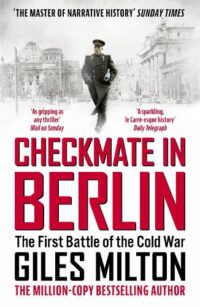
Checkmate in Berlin is a narrative non-fiction book detailing the fate of Berlin following the Allied and Soviet conquest of Nazi Germany in 1945. It begins with the city’s apocalyptic fall and ends with the lifting of the Soviet blockade which surrounded its western sectors in 1949.
An epilogue notes the formation of NATO and the UN. Though he died just days before the conquest, America’s Roosevelt supplied much of the materiel (weapons and supplies) for Russia’s campaign against Hitler as well as most of the European and all of the Pacific firepower. It was his dream to set up the UN to deter future conflicts, though the body seems as impotent today as it was regarded in the years following the war.
The global overlords converged on Berlin to defeat Hitler’s Nazism, turning it into the epicentre of an epic East-West confrontation which was to become the Cold War and shape our world. It was the USSR’s Stalin who entered the city first. Allied relations started warmly but nose dived as Russia then attempted to oust America, Britain and France from the city in a bid for European domination where Hitler left off.
The book follows key American and British personalities, so presents a Western perspective on the city’s division, restoration and management by the joint military powers. Having been virtually blown to bits in 1945, Berliners found themselves in a new battle for survival during the subsequent occupation.
The lessons from history are apparent and timely with Russia’s war in Ukraine. The book chronicles sham Soviet elections, bribes for votes, back to front narratives, forced deportations, currency displacement, targeting of civilians, horrendous levels of rape (and denied abortions), dishonesty, and contempt for international agreements. It also illuminates Russia’s drive to create narrative and seize tactical initiative (though often desperate, ill-judged and made up as it goes along), while the West typically plays whac-a-mole from the back foot. It was Churchill who said, in 1948, that the Soviets respect strength and detest military weakness, and it’s interesting to hear the same words repeated by exiled Russians today. Ultimately, Berlin was freed because the West simply didn’t accept intimidation. All that said, western bad apples were responsible for vast amounts of looting and corruption in Berlin too.
France had a relatively inglorious role in Berlin (mirroring its contribution to the wider war), and seemed true to character in 2022, calling for Russia’s appeasement and describing NATO as brain dead, though it’s now growing again. Back then, Stalin blamed France for opening the doors to the enemy. The country will have nightmarish memories of WW2 occupation, which I’m sure it wouldn’t wish on anyone today. In a first, it’s now pledged heavy weapons for Ukraine’s defense.
The book goes on to describe the West’s Marshall plan to rebuild Germany, to introduce the Deutschmark in West Berlin, and secure it’s freedom. This so inflamed the Soviets, that a blockade of the western city followed, requiring a mammoth airlift by the western allies for almost a year to keep the city alive. Berliners believed a third world war lay ahead amongst the still shattered remains of the second.
So, what of those conquered Berliners? The book shares some of their horrendous experiences, though they received little sympathy at the time. The survivors had lived the Nazi dream, bestowed horrors on millions, and simply reaped what they had sowed.
Are there lessons from the wider war which led to Berlin’s fate? Countries seemed too eager to declare war on each other, albeit more slowly in round two, than one. Thankfully, better judgement contains today’s battlefield conflict in Ukraine. But, appeasement and capitulation emboldened Hitler, as it has Putin, at escalating cost. Autocrats, tyrants and allies are green lit and ‘World’ starts to mate with ‘War.’
The book makes only the briefest mention of Hitler’s fate though it could have easily closed that grizzly storyline. It finishes with the fate of key western personalities though it doesn’t conclude on the Russians. I would like to have read about Berliners’ reactions to shattered Nazi delusions and the fate of war criminals who were not deported—after all, there were millions inside the city, and three of Hitler’s closest henchmen were held in captivity during the city’s post-war turmoil.
Overall Verdict: Loved it! I was glued and thrilled beginning to end. You must read this book first, and take it with you if you visit Berlin with an eye on history. It also illuminates Russia’s war in 2022 in many ways.

There are scores of good quotes, but here are a handful of my favourites:
“[At a Berlin hospital]: ‘Wounded men with their bandages falling from them were dragging themselves along the corridors and crawling on all fours up the stairs, shouting, “the Russians are here.”’ After it was bombed ‘the Russians, in their madness, had been burned to death with the women they had raped.’”
“Elena Rzhevskaya was summoned to Colonel Gorbushin’s office and handed a crimson box with a soft satin lining, the kind that is used for perfume bottles or cheap pieces of jewellery. Curious, she asked what was inside. Gorbushin told her it contained Hitler’s jaws.”
“‘[The Russians] will promise anything, sign anything, provided it benefits them, and will scrap the pledge the moment it doesn’t.'”
“[Howley]: ‘…who took the daily insults, threats and privations of the Communists’ … had also been quick to realise that you need to punch hard and low if you are going to win.”
“Alexander Dymshitz was a former professor at Leningrad University…” 🤣
Click here to get Checkmate in Berlin on Amazon
—————————————————————————
Other interesting reviews which you may have missed (click the title name):
Slaughterhouse-Five: Very readable WW2 fiction, if you can get over the odd combination of Dresden vs aliens and Eternalism, and an ambiguous ending.
Astronaut Wives Club: A great non-fiction book which does exactly what it says in the title.
Rocket Men: Another amazing book which retells mankind’s first foray to the moon on Apollo 8.
The Book of Daniel: A thriller, echoeing the fate of the real Rosenbergs, convicted and executed as American Communists during the fifties Red Scare.
—————————————————————————
Connect with me
What did you think of this or last month’s review?
What other books, movies (or anything) would you recommend?
I’d love to hear from you.
Connect with me by clicking on the socials on the homepage and have your say.


